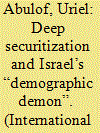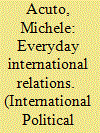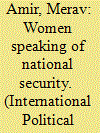|
|
|
Sort Order |
|
|
|
Items / Page
|
|
|
|
|
|
|
| Srl | Item |
| 1 |
ID:
136099


|
|
|
|
|
| Summary/Abstract |
Securitization theory's core contention—the social construction of security as a “speech–act”—is perceptive and productive, yet insufficiently attentive to societies engulfed in profound existential uncertainty about their own survival. Such societies are immersed in what I call “deep securitization,” whereby widespread public discourses explicitly frame threats as probable, protracted, and endangering the very existence of the nation/state. Under deep securitization, to politicize is to securitize, sectors intensely intertwine, political legitimacy's object is the polity/identity itself, and securitization steps are typically nonbinary and nonlinear. Empirically, if some securitizations are deeper than others, Israel's is one of the deepest. In this study, I examine this exceptionally apt, though little-examined, case for securitization theory. Israeli public discourse abounds with “existential threats,” invariably depicting the Jewish people and polity as endangered. The article analyzes the securitization of demography and its linkage to geography and democracy in the Israeli-Jewish discourse and praxis.
|
|
|
|
|
|
|
|
|
|
|
|
|
|
|
|
| 2 |
ID:
136096


|
|
|
|
|
| Summary/Abstract |
Garbage is stuff that matters: the generation, disposal, and management of waste represent some of the most visceral flows in our society. Yet most international scholars continue to regard it as trivial to focus on the mundane practices and menial materiality associated with managing rubbish. Contra this dissociation, and through an analytics of assemblages, I argue that international theory can (and nowadays must) encompass both the grand designs of diplomacy and the mundane cosmopolitics of everyday life. In the everyday, the “international” is embodied, performed, and domesticated. I chart these multi-scalar connections as they unfold in Sydney, Australia, demonstrating how a focus on a global challenge such as climate change has been redefining the mundane realities of waste management.
|
|
|
|
|
|
|
|
|
|
|
|
|
|
|
|
| 3 |
ID:
136098


|
|
|
|
|
| Summary/Abstract |
EU citizenship is often regarded as the culmination of a process whereby the transnational mobility of “workers” has led to the granting of rights to “humans” qua citizens, with both legal scholars and ethnographers emphasizing its normative significance in this respect. Challenging such a narrative, this study sets out to highlight the contingent nature of a postnational EU citizenship, with reference to the lived experiences of migrant Roma. As a first step, we highlight the conditionality within EU law associated with the granting of rights to those enacting EU citizenship by residing within EU territory beyond their own member state. In a second step, we highlight the variable ways in which such conditionality is deployed in different national contexts, with reference to the frameworks in France and Spain. While the former has deployed these conditions in a manner that has excluded EU citizens, particularly migrant Roma, the latter—at least for a time—was more permissive in its granting of rights to EU citizens than EU law required. However, in a third step, we suggest that the lived experiences of migrant Roma in these two national contexts have not been as different as the legal differences suggest. Drawing on ethnographic fieldwork on Romanian Roma in two municipalities near Barcelona, we demonstrate the ways in which a local politics of exclusion is legally possible, even within an ostensibly permissive juridical framework of citizenship. We highlight how the ambiguity of a multilevel citizenship not only opens up possibilities for multifaceted forms of exclusion, but also for various forms of resistance, both within and beyond a juridical citizenship framework.
|
|
|
|
|
|
|
|
|
|
|
|
|
|
|
|
| 4 |
ID:
136100


|
|
|
|
|
| Summary/Abstract |
The literature on climate-induced migration agrees that it is almost impossible to identify individual people as displaced by global warming. At the same time, it is very hard not to see climate-refugees—thanks to the news, reports, films, and charity adverts that picture climate-refugees as the “human face of global warming.” This article engages with this often unnoticed and taken-for-granted field of visibility and investigates its implications for the securitization of climate-induced migration. Based on a Foucauldian notion of security, the paper conducts a visual discourse analysis of 135 images collected from publications, newspapers, and Web sites on climate-induced migration. Throughout this analysis, the climate migrant/refugee appears as a racialized figure, a passive and helpless victim of global warming. In turn, global warming is pictured as an overwhelming, omnipresent, and erratic threat, endangering large parts of the global population. This field of visibility showcases a shift from liberal biopolitics in the name of human security toward securing through fostering resilience. This shift depoliticizes the issue of global warming, makes those affected by it responsible for their own survival, reinstates them as the dangerous Other and so bars them from crossing the global “life-chance divide.”
|
|
|
|
|
|
|
|
|
|
|
|
|
|
|
|
| 5 |
ID:
136097


|
|
|
|
|
| Summary/Abstract |
The production of reports and the distribution of information have become integral to the operation of many non-governmental organizations. In this regard, the fact that the all-women organization of Checkpoint Watch publishes reports about the Israeli checkpoints in the occupied West Bank seems to comply with current trends. However, the reports—most of which are short repetitive descriptions of the banality and everydayness of the military checkpoints, counting the number of people and cars waiting, commenting on the manner in which the checks are performed and meticulously documenting what mostly amounts to minor incidents of humiliation and distress—do not seem to abide by any convention of reporting. This work analyzes the reporting praxis of the organization and claims that it should be understood as a form of activism in and of itself. Tracking the ways in which the reports address the Israeli public through the concept of parrhesia, the work suggests that this form of reporting enables the women activists to use their gendered marginality to make their way into the highly masculinized and militarized Israeli security discourse.
|
|
|
|
|
|
|
|
|
|
|
|
|
|
|
|
|
|
|
|
|